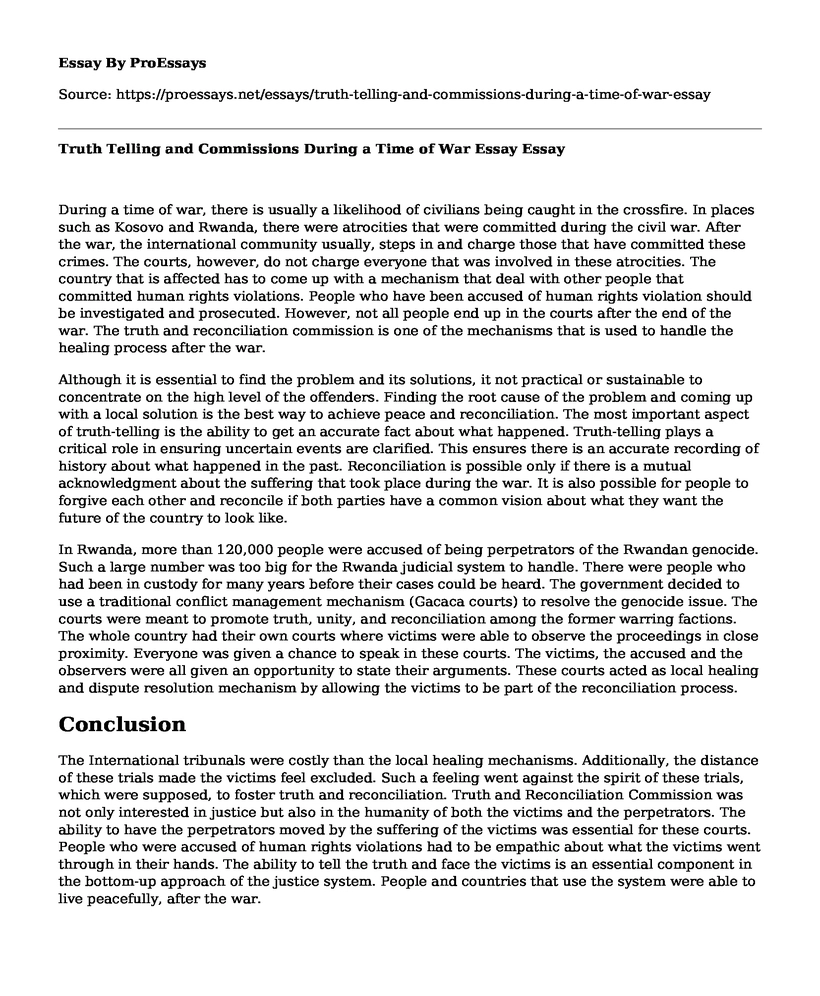During a time of war, there is usually a likelihood of civilians being caught in the crossfire. In places such as Kosovo and Rwanda, there were atrocities that were committed during the civil war. After the war, the international community usually, steps in and charge those that have committed these crimes. The courts, however, do not charge everyone that was involved in these atrocities. The country that is affected has to come up with a mechanism that deal with other people that committed human rights violations. People who have been accused of human rights violation should be investigated and prosecuted. However, not all people end up in the courts after the end of the war. The truth and reconciliation commission is one of the mechanisms that is used to handle the healing process after the war.
Although it is essential to find the problem and its solutions, it not practical or sustainable to concentrate on the high level of the offenders. Finding the root cause of the problem and coming up with a local solution is the best way to achieve peace and reconciliation. The most important aspect of truth-telling is the ability to get an accurate fact about what happened. Truth-telling plays a critical role in ensuring uncertain events are clarified. This ensures there is an accurate recording of history about what happened in the past. Reconciliation is possible only if there is a mutual acknowledgment about the suffering that took place during the war. It is also possible for people to forgive each other and reconcile if both parties have a common vision about what they want the future of the country to look like.
In Rwanda, more than 120,000 people were accused of being perpetrators of the Rwandan genocide. Such a large number was too big for the Rwanda judicial system to handle. There were people who had been in custody for many years before their cases could be heard. The government decided to use a traditional conflict management mechanism (Gacaca courts) to resolve the genocide issue. The courts were meant to promote truth, unity, and reconciliation among the former warring factions. The whole country had their own courts where victims were able to observe the proceedings in close proximity. Everyone was given a chance to speak in these courts. The victims, the accused and the observers were all given an opportunity to state their arguments. These courts acted as local healing and dispute resolution mechanism by allowing the victims to be part of the reconciliation process.
Conclusion
The International tribunals were costly than the local healing mechanisms. Additionally, the distance of these trials made the victims feel excluded. Such a feeling went against the spirit of these trials, which were supposed, to foster truth and reconciliation. Truth and Reconciliation Commission was not only interested in justice but also in the humanity of both the victims and the perpetrators. The ability to have the perpetrators moved by the suffering of the victims was essential for these courts. People who were accused of human rights violations had to be empathic about what the victims went through in their hands. The ability to tell the truth and face the victims is an essential component in the bottom-up approach of the justice system. People and countries that use the system were able to live peacefully, after the war.
Cite this page
Truth Telling and Commissions During a Time of War Essay. (2022, Sep 22). Retrieved from https://proessays.net/essays/truth-telling-and-commissions-during-a-time-of-war-essay
If you are the original author of this essay and no longer wish to have it published on the ProEssays website, please click below to request its removal:
- History Essay Example - Mesopotamia: The First Cities
- Isaac Newton Biography
- The Half Has Never Been Told Book Review Paper Example
- Compare and Contrast Essay on Paul Revere From the Movie Sons of Liberty and Real Life
- Essay Sample on America's History
- Essay Sample on 2008 War Between Georgia & Russia: The Five-Day Battle
- French Revolution: People's Dissatisfaction With Leadership - Essay Sample







